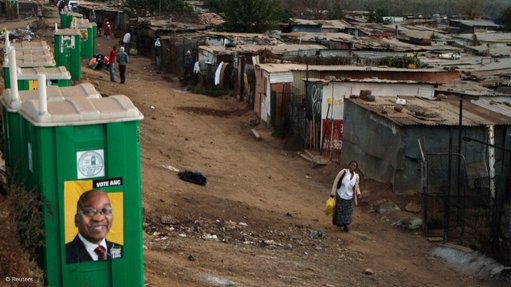
Photo by: Reuters
The Southern African Catholic Bishops’ Conference (SACBC) Justice and Peace Commission has asked the SA Human Rights Commission to investigate the prevalence of bucket toilets in Free State province and Nelson Mandela Bay.
“We wish to speak out against the inhumane conditions and the indecent sanitation in the informal settlements that severely deprive the urban poor of their dignity,” says Bishop Gabuza, the chairperson of the SACBC Justice and Peace Commission. “The bucket system is a dehumanising legacy of apartheid that is refusing to die.
This system always reminds us of the indignity and spatial injustice that black people suffered in urban areas during the period of apartheid. Therefore, it deeply pains us that in the Free State province thousands of people are still being denied their most fundamental right to dignity.”
According to Statistics South Africa the Free State is the province with the highest number of households with the bucket sanitation system. The complaint of the SACBC Justice and Peace Commission covers Free State, especially the settlements of Botshabelo, Thaba-Nchu, Thabong, and Mafube.
“We are also concerned with the continued use of sanitation buckets in Nelson Mandela Bay Municipality. We know that the mayor has pledged to eradicate the problem by December 2017. We nevertheless wish to exert more pressure to ensure that this happens,” adds Bishop Gabuza.
In Nelson Mandela Bay Municipality the Human Rights Commission has been asked to investigate rights violations in Walmer, Uitenhage, Bethelsdorp, Bloemendal, Ibhayi and Motherwell.
“We are aware of the challenges in eradication of the bucket system, including high levels of rural-urban migration, capacity constraints in municipalities, community acceptance and terrain and environmental challenges. However, we believe that 23 years into constitutional democracy a developmental state should have equipped itself with the necessary capacity to overcome all these challenges in a coordinated and accelerated manner.”
The Department of Water and Sanitation has made significant progress in its mandate to eradicate bucket toilets, including the establishment of a financing instrument in the form of a bucket eradication grant. However, more needs to be done.
“We call on the Department of Water and Sanitation, together with the Free State Department of Cooperative Governance and Traditional Affairs, to develop a provincial action plan that ensures an accelerated and coordinated response to the bucket crisis in Free State province.”
Bishop Gabuza has also called for stronger sanitation governance that should include transparency with respect to business plans submitted as a requirement for receiving the bucket eradication grant. “All the municipalities in the Free State province that are recipients of bucket eradication grants must have submitted business plans as a funding requirement. To strengthen sanitation governance, we ask that copies of these business plans be made available to the public on the website of the Department of Water and Sanitation.”
In May 2016 the Department of Water and Sanitation decided to make copies of water use licences readily available to the public: “We ask that the department does the same with the municipal business plans relating to the bucket eradication grant. By opening up the business plans to public scrutiny, the department will strengthen the sanitation governance and accelerate the bucket eradication programme in the Free State.”
Issued by Southern African Catholic Bishops’ Conference Justice and Peace Commission